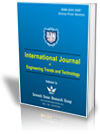Newton-Raphson Load-Flow Analysis in Complex form with UPFC
Citation
S.K.Salma Sulthana, M.Naga Jyothi"Newton-Raphson Load-Flow Analysis in Complex form with UPFC", International Journal of Engineering Trends and Technology (IJETT), V27(1),33-39 September 2015. ISSN:2231-5381. www.ijettjournal.org. published by seventh sense research group
Abstract
The important implication of complex-variable
Newton-Raphson load flow analysis is that reduction in
memory access is achieved by the complex-variable Newton-
Raphson method. This significant reduction in memory access
achieved will lead to the advantage of substantial reduction in
computing time which will increase the efficiency. In addition
complex-variables offer a flexible and direct approach for
modelling of UPFC. This paper develops a Newton-Raphson
load flow analysis formulation which includes UPFC. A brief
analysis on load flow calculation methods and UPFC is
presented. Proposed system is simulated for IEEE 30 BUS
system using Mi-Power software.
References
1) N. G. Hingorani, “Power Electronics in Electric Utilities: Role of
Power Electronics in Future Power Systems”, Proceedings of the
IEEE, Vol.76, NO. 4, pp 481-482, April 1988.
2) N. G. Hingorani, “Flexible AC transmission,” IEEE Spectra, vol.
30, no. 4, pp. 40–45, April 1993.
3) N.G.Hingorani and L.Gyugyi, “Understanding FACTS: concepts
and technology of Flexible ac transmission systems”, IEEE Press,
NY, 1999.
4) Hingorani, N.G., “High power electronics and flexible AC
transmission system”, IEEE Power Eng. Reo, July 1988.
5) K.R.Padiyar, “FACTS Controllers in power transmission and
distribution”, New Age International Publishers, 2007.
6) Abdul Haleem, Ravireddy Malgireddy, “Power Flow Control with
Static Synchronous Series Compensator (SSSC)”, International
Conference on Science and Engineering (ICSE), 2011, ISBN: 978-
981-08-7931.
Keywords
Load flow analysis, Newton-Raphson method,
complex functions and variables, FACTS devices.



